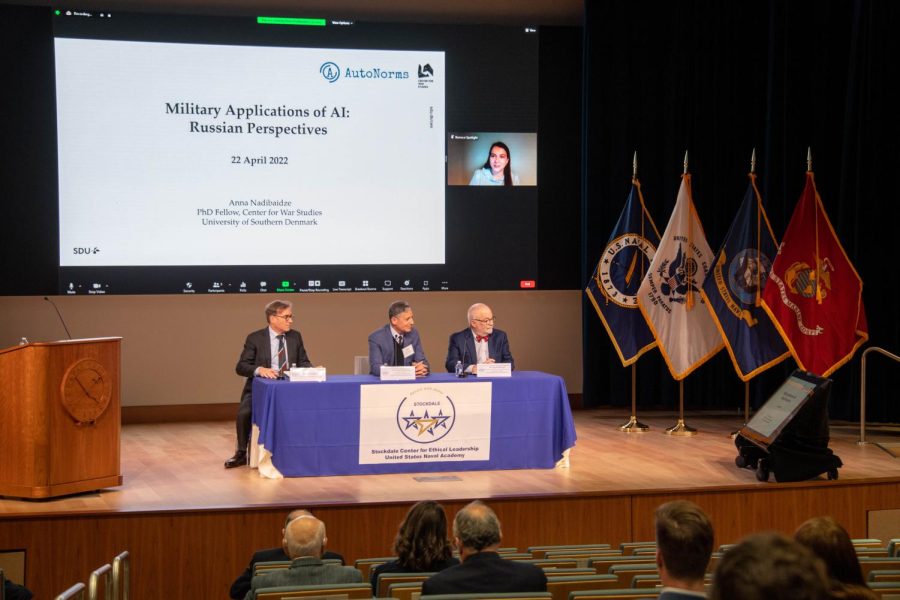ChatGPT may appear “good enough” for certain tasks, but risks of repeated inaccuracy—even manipulation are present
U.S. and other countries assessing benefits/risks of AI
U.S. Naval Academy hosts 21st annual McCain Conference 2022. The Ethics of Military Artificial Intelligence (AI) panel explores ethics relevant to military operations.
April 17, 2023
Italy has become the first Western country to ban ChatGPT, the Italian data-protection authority Garante reported a data breach and user data collection of minors as reasons for the temporary ban.
“There appears to be no legal basis underpinning the massive collection and processing of personal data in order to ‘train’ the algorithms on which the platform relies,” Garante said in a public statement.
Another concern is ChatGPT’s known tendency to provide factually incorrect information to users.
“As confirmed by the tests carried out so far, the information made available by ChatGPT does not always match factual circumstances,” the Garante statement continues.
ChatGPT, developed by California company OpenAI, has been at the forefront of AI development for some time now. This last year has seen rapid advancement of the technology, many users have been unable to properly utilize features before a new week of innovations make what they learned already obsolete. Nations across the world have begun to recognize and plan for a near-future where AI influences our everyday lives.
Many are familiar with the widely reported abilities of AI tech, it can write literature, produce music, art, and even mimic human emotions in text. Along with this, its ability to read and utilize any sort of data for any purpose is remarkable.
Although the United States has yet to propose formal legislation regulating AI—President Biden acknowledged the need to assess and control the risks of rapid-paced development in a tweet sent on April 4th.
“Artificial Intelligence has enormous potential to tackle some of our toughest challenges. But we must address its risks. That’s why last year, we proposed an AI Bill of Rights to ensure that important protections for the American people are built into AI systems from the start,” President Biden tweeted.
The European Union has already proposed legislation that would regulate AI tech, under the European AI Act the use of AI in education, law enforcement, and the judicial system would be heavily restricted.
ChatGPT is not available in nations with heavy internet censorship like Iran, Russia, and China. Large Chinese companies such as Baidu and Alibaba have announced plans for their own Chatbot AI tech.
The urgency for regulation comes in light of the recent release of ChatGPT4. Concerns have been raised by influential people around the world that include top researchers, scientists, professors and CEO’s of some of the top multi-national technology companies that AI is evolving too quickly for us to keep up.
With the risk and unknown dangers of “free-lancing” AI there’s also the ethical questions surrounding AI programs like ChatGPT.
In a recent column from The Atlantic, Ian Bogost wrote critically in a piece titled, “ChatGPT is Dumber Than You Think”—and among the things lacking according to Bogost in ChatGPT are its ability to “understand the complexity of human language and conversation.”
ChatGPT at its core, is simply “trained to generate words based on a given input” without the meaning, depth and insight around those responses.
“Furthermore, the reliance on ChatGPT for conversation raises ethical concerns. If people begin to rely on a machine to have conversations for them, it could lead to a loss of genuine human connection. The ability to connect with others through conversation is a fundamental aspect of being human,” Bogost said.
Along with advancements from the company, OpenAI, open-sourced projects online have produced incredible strides of their own. Some fear that these open-sourced projects may be more difficult to regulate since they are developed by freelance engineers around the world on their own volition.
Auto-GPT is one of these projects, it is an autonomous AI agent that is able to write and execute code through Python and ChatGPT. This allows it to develop and self-improve, an important benchmark towards a fully autonomous AI being.


